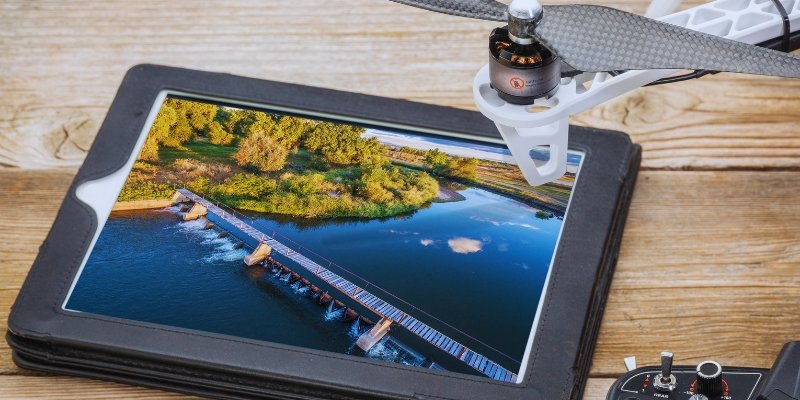Establishing a Drone Photography Business in Singapore: A Guide for Aspiring Entrepreneurs

The rise of drone technology has transformed various industries, making drone photography a sought-after service in today’s market. Whether for real estate, events, or marketing, the demand for high-quality aerial imagery is growing rapidly. If you are an aspiring entrepreneur looking to tap into this lucrative market, establishing a Drone Photography Business in Singapore could be your next big venture. This guide will provide you with essential insights on why to start this business, the steps to set it up, and important financial considerations.
Reasons to Start a Drone Photography Business

Increasing Demand: As businesses and individuals seek unique perspectives for their projects, the demand for drone photography continues to rise. From capturing stunning visuals for real estate listings to providing aerial footage for events, the opportunities are vast.
Technological Advancements: The rapid development of drone technology has made high-quality aerial photography more accessible and affordable. This means you can offer professional-grade services without the need for extensive investment.
Diverse Applications: Drone photography is applicable across various sectors, including real estate, tourism, construction, and agriculture. This diversity allows you to cater to a wide range of clients, enhancing your business’s potential.
Creative Expression: If you have a passion for photography and technology, starting a drone photography business allows you to combine these interests. You can express your creativity while providing valuable services to clients.
Detailed Steps to Establish a Drone Photography Business

Conduct Market Research: Begin by researching the local market for drone photography services. Identify your target audience, understand their needs, and analyze your competition. This information will help you tailor your services and marketing strategies.
Develop a Business Plan: Create a comprehensive business plan outlining your business goals, target market, service offerings, and marketing strategies. A solid business plan will serve as your roadmap and can help attract investors or secure financing.
Register Your Business: Choose a suitable business structure and register your Drone Photography Business with the Accounting and Corporate Regulatory Authority (ACRA). Decide whether to operate as a sole proprietorship, partnership, or private limited company.
Obtain Necessary Licenses: In Singapore, operating a drone for commercial purposes requires a license from the Civil Aviation Authority of Singapore (CAAS). Familiarize yourself with the regulations and ensure compliance to avoid legal issues.
Invest in Equipment: Purchase high-quality drones and photography equipment. Your investment in technology will directly impact the quality of your services. Consider additional accessories like extra batteries, memory cards, and editing software.
Build a Portfolio: Start building a portfolio showcasing your drone photography skills. Offer free or discounted services to friends or local businesses to gather samples of your work. A strong portfolio will help attract clients.
Market Your Services: Utilize digital marketing strategies, including social media, content marketing, and search engine optimization, to promote your Drone Photography Business. Networking with real estate agents, event planners, and marketing agencies can also lead to valuable referrals.
Launch Your Business: Once everything is in place, officially launch your business. Consider hosting a launch event or offering promotional packages to attract your first clients.
Challenges and Considerations for Both Local and Foreign Entrepreneurs

Regulatory Compliance: Navigating the regulatory landscape can be challenging, especially for foreign entrepreneurs. Ensure you understand local laws regarding drone usage, privacy, and data protection to avoid penalties.
Cultural Sensitivity: Understanding local customs and business practices is crucial. Tailor your services and communication style to resonate with Singaporean clients, ensuring a positive experience.
Intense Competition: The drone photography market is competitive. To stand out, focus on delivering exceptional customer service, maintaining high-quality standards, and continuously improving your skills.
Client Trust: Building trust is essential in the photography sector. Ensure transparency in your processes, deliver on promises, and maintain professionalism to foster long-term client relationships.
Financial Planning Aspects

Startup Costs: Estimate your initial investment, including costs for drones, cameras, licenses, marketing, and insurance. Understanding your startup costs will help you secure funding and manage your budget effectively.
Operational Expenses: Prepare for ongoing costs such as equipment maintenance, software subscriptions, marketing, and insurance. Regularly reviewing these expenses can help you identify areas for cost optimization.
Revenue Projections: Create realistic revenue projections based on market research and expected client acquisition. Consider factors such as seasonal trends and potential growth as your business gains traction.
Funding Options: Explore various funding avenues, including personal savings, bank loans, or government grants aimed at supporting tech startups. A well-prepared business plan can help attract investors and secure necessary funding.
Conclusion
Establishing a Drone Photography Business in Singapore presents a unique opportunity for aspiring entrepreneurs to enter a growing industry. By following the outlined steps and addressing potential challenges, you can create a successful business that meets the increasing demand for aerial imagery.
If you are ready to embark on your entrepreneurial journey, contact Company Formation Specialist today. Our team of experts is here to guide you through the process of establishing your Drone Photography Business in Singapore, providing the support you need to succeed in this exciting field. Let us help you turn your passion into a profitable venture.
Frequently Asked Questions
1. What are the main reasons to start a drone photography business in Singapore?
Answer: The demand for drone photography is growing, driven by industries such as real estate, tourism, and marketing. Technological advancements make high-quality aerial photography accessible, allowing entrepreneurs to cater to a wide range of clients.
2. What licenses are required to operate a drone photography business in Singapore?
Answer: A commercial drone operator in Singapore needs a license from the Civil Aviation Authority of Singapore (CAAS). Compliance with regulations is essential to operate legally.
3. How much does it cost to start a drone photography business?
Answer: Startup costs include purchasing high-quality drones, cameras, editing software, and licenses. Initial investments vary but should cover essential equipment, marketing, and insurance.
4. What challenges might foreign entrepreneurs face in this industry?
Answer: Foreign entrepreneurs may encounter regulatory complexities and cultural differences. Navigating Singapore’s drone usage laws and understanding local customs can help in establishing trust and compliance.
5. How do I build a client base for my drone photography business?
Answer: Networking with professionals in related fields, using digital marketing, and building an impressive portfolio can help attract clients. Additionally, referrals from satisfied clients can drive growth.
6. Can drone photography be applied across multiple industries?
Answer: Yes, drone photography is valuable in sectors such as real estate, tourism, construction, and agriculture, offering numerous business opportunities.
7. What are the primary financial considerations when starting this business?
Answer: Key financial aspects include calculating startup and operational expenses, revenue projections, and exploring funding options, such as personal savings or government grants.
8. How can I differentiate my drone photography business from competitors?
Answer: Providing exceptional customer service, maintaining high-quality standards, and showcasing a unique style in your portfolio can help your business stand out in a competitive market.
9. What marketing strategies work best for promoting a drone photography business?
Answer: Digital marketing methods like social media, SEO, and content marketing are effective. Networking with real estate agents, event organizers, and agencies can also lead to client referrals.
10. What skills are essential for running a successful drone photography business?
Answer: Aside from photography skills, understanding drone technology, having strong marketing abilities, and managing client relationships are key to running a successful drone photography business.

